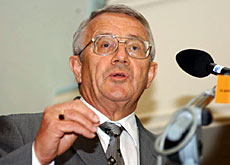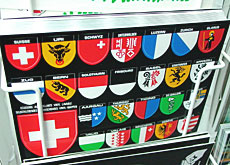Federalism is not cure for all political ills

A leading Swiss expert taking part in the International Conference on Federalism in Brussels says this system of government is not the answer to all problems.
In an interview with swissinfo, former justice minister Arnold Koller says that increasing regionalisation in the world could leave Switzerland more isolated.
Koller, who heads a working group on federalism and international relations, was one of more than 600 politicians and experts from around 80 countries attending the conference, which ended on Saturday.
Many argued at the three-day meeting that federal forms of government could contribute to peace and stability. Koller is more cautious in his assessment.
swissinfo: The central theme of the conference was the role federalism can play in ending wars. Do you think it can?
Arnold Koller: Experience shows that federalism can contribute to resolving ethnic problems and has a preventive effect. But it would be an exaggeration to think that it can solve all problems. We just have to look at what happened in the former Yugoslavia.
swissinfo: From your point of view, what were the highlights of the meeting?
A.K.: The debate in the European Union on its new constitution was very important and was not only of interest to Europeans but also Canadians, Americans and Africans.
There is a tendency towards regionalisation around the world as well as the creation of regional organisations.
The EU model is well known, but there are others such as Mercosur [in South America] and Nafta [North American Free Trade Agreement]. And Africans envisage creating an African union.
In my group, there was much discussion on whether the EU already represented a federation. I didn’t find this very useful. The EU is certainly evolving towards becoming a federal state. The question is whether the redistribution of responsibilities proposed by the constitution sufficiently guarantees real autonomy for EU member states.
swissinfo: What conclusions have you drawn from the conference for Switzerland?
A.K.: It could be a problem for Switzerland if the process of regionalisation in the world continues, since the country is not a member of a regional grouping [like the EU]. We could slowly become a victim of our own isolation. We may have to tell the world not to forget about us!
swissinfo: In a controversial report published last month, the think tank, Avenir Suisse, called for doing away with Switzerland’s 26 cantons and replacing them with six “super regions”. How do you view this proposal?
A.K.: I don’t think much of the idea. It’s not realistic. We must intensify cooperation at the regional level. That’s the direction reforms in our country should take.
swissinfo, Barbara Speziali in Brussels
The third International Conference on Federalism in Brussels brought together more than 600 politicians and experts from around 80 countries.
After Canada, Switzerland and Belgium, the conference will move to India in 2007 or 2008.

In compliance with the JTI standards
More: SWI swissinfo.ch certified by the Journalism Trust Initiative


You can find an overview of ongoing debates with our journalists here . Please join us!
If you want to start a conversation about a topic raised in this article or want to report factual errors, email us at english@swissinfo.ch.